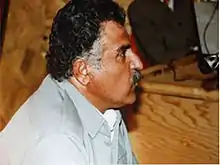Sedigh Kamangar
Sedigh Kamangar (IPA: [s'diːq kəmɑːn'gər]; Kurdish: سدیق کهمانگهر; Persian: صدیق کمانگر; April 1946 – September 4, 1989) known as Kak Sedigh was a lawyer and one of the leaders of Komala, a left-wing Kurdish political party. He was assassinated in Iraqi Kurdistan by an agent of the Iranian government.[1]
Sedigh Kamangar | |
|---|---|
 | |
| Personal details | |
| Born | April 1946 Kamyaran, Kurdistan Province, Iran |
| Died | September 4, 1989 Sulaymaniyah, Iraq |
| Military service | |
| Allegiance | |
| Years of service | 1979 – 4 September 1989 |
| Rank | Military Leader |
| Battles/wars | 1979 Kurdish rebellion in Iran |
Private life
Kak Sedigh was the seventh child and the eldest son of a large family of 10 siblings. He studied Law at the University of Tehran and graduated in 1971. He later started his own law firm in 1974 and worked as a successful lawyer in the city of Sanandaj (Sena).
Political Struggle
As a young teenager Kak Sedigh had always been curious about the society and questioned its different patterns. His political engagement enhanced during his time at university where he came to know other likeminded students. Kak Sedigh later joined Komala and became one of the most prominent leaders there. Komala was a kurdish socialist and Marxist group which separated itself from the Soviet bloc and worked for a society based on liberty, equality and social justice.
Kak Sedigh was a highly respected and admired person among the people of the Kurdistan province and is best known for his strong leadership during the 1979 post-revolutionary tensions between the Islamic Republic and the Kurdish people in Iranian Kurdistan. Having experienced political, ethnic and cultural discriminations under the Shah’s regime, the Kurds now demanded these rights from the new government.[2]
Days after the 1979 revolution, Kak Sedigh encouraged the people of Sanandaj directly from the local radio and television station, to take over the city’s military base prior to the new government’s arrival. And so the city was now in the hands of the Kurdish people and freedom fighters (peshmerga). Consequently, the leaders in Tehran sent a delegate consisting of members of the Council of the Islamic Revolution, including Taleghani, Rafsenjani and Banisadr, to Sanandaj to solve the problem. Thus, a meeting was organised where Taleghani, not aware of Kak Sedigh’s presence at this meeting, asked: “Who is this Sedigh Kamangar so that I can execute him right away?". All of a sudden, Kak Sedigh fearlessly shouted out “I am Sedigh Kamangar. Who are you? And what’s your place in this revolution?”
The government’s representatives who had come to bring Kak Sedigh and other leaders to "Islamic justice", were forced to negotiate with the Kurds and accept their demands on organising their own councils. However, this was never implemented by the central government and Kurdish revolt was dealt with harshly after Khomeini’s order of a holy war against the Kurds. Nevertheless, the Kurdish people managed to keep their autonomy until the spring of 1980 when a huge military campaign was organized against them.[3] Subsequently, Komalah and some other Iranian opposition groups were forced to retreat to the Iraqi Kurdistan where Kak Sedigh and his comrades continued their resistance.
Assassination
Kak Sedigh was assassinated at Komalah’s headquarters in Iraqi Kurdistan on the night of September 4, 1989 by his own bodyguard Tofigh Gerjhali, an agent sent from the Iranian government. Gerjhali managed to flee on the night of the assassination.
Kak Sedigh had earlier lost two brothers in this struggle against the Islamic government, Raauf Kamangar in 1979 and Maaruf Kamangar in 1983.
References
- "حقوق بشر و دموکراسی برای ایران". حقوق بشر و دموکراسی برای ایران.
- M. Rubin, Are Kurds a Pariah Minority?, Social Research, Vol.70, No.1, Spring 2003, pp.295-330
- "Archived copy". Archived from the original on 2010-11-06. Retrieved 2010-11-06.CS1 maint: archived copy as title (link)